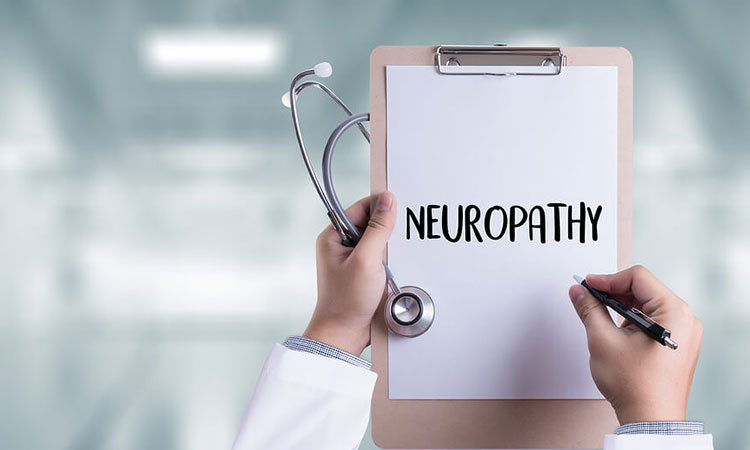
Alcoholic neuropathy is a severe disorder caused by heavy alcohol consumption that is characterized by nerve damage and unusual sensations in the limbs, impaired mobility, and loss of some bodily functions.
When a person drinks an excessive amount of alcohol for a prolonged period, peripheral nerves can be damaged, and he or she may start to experience a tingling sensation in the limbs. Peripheral nerves connect both the brain and spinal cord to muscles, limbs, and sensory organs. Using these nerves, the brain is able to regulate parts of the body such as muscles and joints and obtain sensory information.
When alcohol has caused damage to the peripheral nerves, this is referred to as alcoholic neuropathy. People who drink excessively on a routine basis are at risk of developing this disorder. In fact, some experts estimate that nearly two-thirds (65%) of people in the U.S. who have been diagnosed with an alcohol use disorder (AUD) also suffer from alcoholic neuropathy.
How Does Alcohol Cause This Condition?
Heavy, prolonged consumption of alcohol can result in malnutrition as well as nerve damage, and both are key contributing factors in the development of alcoholic neuropathy. Alcohol can impair the processing, transportation, and absorption of vital nutrients.
Some people with an AUD also have inadequate food intake, which can result in deficiencies in vitamins B6, B12, and E, as well as thiamine, niacin, and folate. Deficiencies in these essential nutrients can negatively imp0act overall health and prevent nerves from functioning correctly.
Symptoms
Alcoholic neuropathy can manifest in different ways. Some people may experience only one symptom, while others have many.
People who drink heavily regularly and have one or more of the following symptoms in the affected areas should contact a doctor as soon as possible:
Limbs
- Cramps
- Loss of movement
- Muscle weakness
- Muscle atrophy
- Muscle spasms or contractions
- Numbness or loss of sensation
- Pins and needles sensations
- Tingling or prickling sensations
Urinary and Bowel System
- Incontinence
- Urinary retention
- Constipation
- Diarrhea
Other symptoms may include the following:
- Abdominal bloating
- Dizziness or fainting
- Difficulty swallowing
- Impaired speech
- Infertility in men
- Sexual dysfunction
- Temperature sensitivity
- Nausea or vomiting

Alcoholic Neuropathy Diagnosis
An esophagogastroduodenoscopy examination may be performed to diagnose alcoholic neuropathy. Several other tests can be used to diagnose alcoholic neuropathy, and more than one is often necessary. These include a blood chemistry test, electromyography, nerve biopsy, and upper gastrointestinal and small bowel series.
A doctor will also conduct a neurological examination to evaluate a person’s reflexes, coordination, muscle strength, and sensory function. He or she may also test the functioning of the liver, kidneys, and thyroid and order blood tests to check for nutritional deficiencies.
Treatment for Alcoholic Neuropathy
Identifying the symptoms early and seeking treatment can reduce the risk of permanent disabilities. The best thing a person suffering from alcoholic neuropathy can do is to discontinue alcohol consumption as soon as possible. Inpatient detox and long-term rehab may be recommended when a person’s alcohol use disorder is chronic and severe. Others may opt for outpatient treatment.
Symptom Management
Alcoholic neuropathy is not considered to be curable and can make daily life challenging, so it is important to begin by managing the symptoms. A treatment plan may include one or more of the following approaches:
- Vitamin supplementation, including vitamins E, B6, and B12, and others
- Over-the-counter pain relievers for minor discomfort related to alcoholic neuropathy
- Prescription pain relievers, such as gabapentin, tramadol, anticonvulsants, or capsaicin cream
- Medications for urinary problems, such as duloxetine, imipramine, and tolterodine
- Physical therapy techniques, because gentle activities and exercises and can help improve muscle and balance impairments
- Orthopedic instruments to aid in mobility, such as pull bars in the bathroom, stair lifts, etc.
- Other safety measures, including advice for people who are troubled by a loss of sensation
- Exercise, as recommended by a physiotherapist who specializes in neuropathy
Alcoholic Neuropathy Outlook
Alcoholic neuropathy is a potentially severe condition that can result in chronic pain, loss of bodily functions, and permanent disabilities. However, as noted, recognizing the symptoms early and receiving medical attention can significantly reduce the impact of the disorder.
A person can dramatically improve their outlook by quitting drinking and ensuring that they are receiving the proper balance of nutrients. In addition to treatment centers, a wide range of support networks such as Alcoholics Anonymous are available. Individuals with alcoholic neuropathy who comply with treatments and recommendations often make a partial or even a full recovery, depending on the intensity and duration of their alcohol consumption.
Treatment for Alcoholism
Midwood Addiction Treatment offers comprehensive programs that include evidence-based services vital to the recovery process, such as psychotherapy, counseling, medication-assisted therapy, group support, and more. Our highly-trained addiction professionals are dedicated to providing each client with the resources, support, and care they need to recover and experience long-term sobriety and wellness.
If you or someone you know has alcoholic neuropathy or struggling with an alcohol use disorder, contact us today. Discover how we help people free themselves from the chains of addiction and learn how to lead healthy, fulfilling lives!